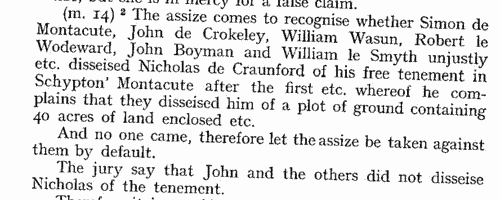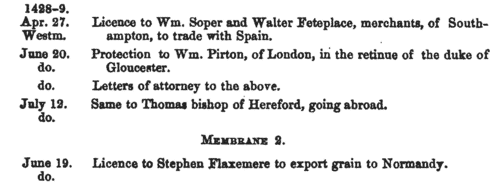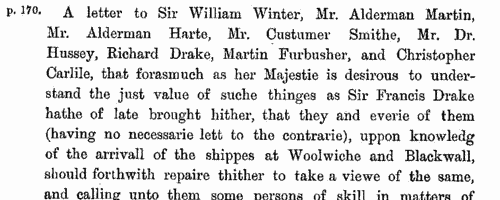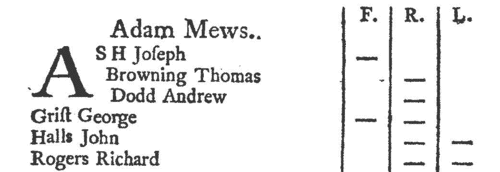Burgan Surname Ancestry ResultsOur indexes 1000-1999 include entries for the spelling 'burgan'. In the period you have requested, we have the following 34 records (displaying 1 to 10): Single Surname Subscription | | | Buying all 34 results of this search individually would cost £190.00. But you can have free access to all 34 records for a year, to view, to save and print, for £100. Save £90.00. More... |
These sample scans are from the original record. You will get scans of the full pages or articles where the surname you searched for has been found. Your web browser may prevent the sample windows from opening; in this case please change your browser settings to allow pop-up windows from this site. Somerset Assizes
(1272-1279)
The records of the assizes held by the royal justices in eyre (itinerant) in Somerset during this period were edited by Lionel Landon and published by the Somerset Record Society in 1926. The justices not only tried all civil actions outstanding on their advent, pleas of the crown and common pleas, but also interrogated the juries of each hundred and borough as to the Articles of the Eyre, inquiring into the king's proprietary rights, escheats, wardships, and questions of maladministration. Appendix I adds some scattered Somerset items from rolls for 1204, 1218 and 1240.BURGAN. Cost: £4.00.  | Sample scan, click to enlarge

| Charter Rolls
(1050-1326)
This abstract of the surviving charter rolls for 1300 to 1326, in the reigns of kings Edward I and II, was prepared by C. G. Crump and A. E. Stamp and published in 1908. The charter rolls not only recorded royal grants of lands, liberties and offices, but also enabled landowners to have their existing charters, their deeds of title, registered by the process of inspeximus and confirmation. After the Statute of Mortmain of 1279, this was of particular importance to religious houses, now greatly restricted in their ability to receive new donations of land, and anxious to prove title to their ancient property. Consequently, many charters of great age were copied onto the charter rolls.BURGAN. Cost: £4.00.  | Sample scan, click to enlarge

| Inhabitants of Yorkshire: Osgoldcross wapentake
(1379)
The poll tax returns for this wapentake, the area around Pontefract.BURGAN. Cost: £6.00.  | Sample scan, click to enlarge

| The English in France
(1436)
King Henry VI of England (one of the grandsons of Charles VI of France) claimed the throne of France (and quartered the fleurs-de-lis of France with the lions of England on the royal standard) as had his predecessors since Edward III, as descendants of Philip IV of France. The English had real power or influence in Brittany, Normandy, Flanders and Gascony, and actual possession of several coastal garrisons, in particular Calais, where the French inhabitants had been replaced by English. Henry VI came to the throne only seven years after his father had trounced the French at Agincourt; but his cousin, Charles VII, who became king of France in the same year, spent his long reign rebutting the English king's claim to his throne by territorial reconquest and consolidation. The English administration kept a series of records called the French Rolls. On these are recorded royal appointments and commissions in France; letters of protection and safe-conduct to soldiers, merchants, diplomats and pilgrims travelling to France from England and returning, and to foreign legations. There are also licences to merchants to export to the Continent, and to captains to transport pilgrims. As Henry VI's reign progressed, and the English grip on northern France loosened, the French Rolls also increasingly include entries concerning the ransoming of English prisoners.BURGAN. Cost: £6.00.  | Sample scan, click to enlarge

| Freemen of London
(1540-1550)
The long series of mediaeval registers and books of admission of the freemen of London was destroyed by fire in 1786. Thirty surviving charred leaves were gathered together and rebound, becoming Egerton MS 2408 in the British Museum. The order is jumbled and generally speaking none can be dated with certainty, although all belong to the very end of the reign of Henry VIII and the start of the reign of his son, Edward VI. These are pages from the admission books. Each entry here usually gives the name of the person admitted to the freedom; his father's name, address and occupation; his entitlement to the freedom, usually by having served out an apprenticeship to a citizen, naming the master and his trade. Then there may follow a cross-reference to M. or N., being two volumes of another set of official books denoted by the letters of the alphabet, and following each other in chronological sequence, which evidently gave details of entries into apprenticeships. These other books no longer exist: but the dates given for entry do identify the start of the apprenticeship, and so give by implication a date for the eventual admission to freedom. In the margin is the name of the city ward and the total of the fee and fine paid on admission.BURGAN. Cost: £4.00.  | Sample scan, click to enlarge

| Liegemen and Traitors, Pirates and Spies
(1586-1587)
The Privy Council of queen Elizabeth was responsible for internal security in England and Wales, and dealt with all manner of special and urgent matters
BURGAN. Cost: £4.00.  | Sample scan, click to enlarge

| Landowners in Jamaica
(1670)
The State Papers Colonial Series, America and West Indies, 1669 to 1674, preserved in Her Majesty's Public Record Office, were edited by W. Noel Sainsbury, Assistant Keeper of the Public Records, and published under the direction of the Master of the Rolls and with the sanction of Her Majesty's Secretary of State for the Colonial Department in 1889. Over 200,000 acres of land in Jamaica had been granted out to a total of 717 families: the Governor, sir Thomas Modyford, transmitted this survey 'by the extraordinary diligence of his Majesty's Receiver-General', listing patentees by parish, giving full name and acreage, to Secretary of State sir Henry Bennet, the Earl of Arlington, 23 September 1670. The population of these rural areas was calculated at 11,898; there being, in addition, about 3,300 persons in the towns of Port Royal and St Jago.BURGAN. Cost: £4.00.  | Sample scan, click to enlarge

|  Masters and Apprentices
(1713) Masters and Apprentices
(1713)
Apprenticeship indentures and clerks' articles were subject to a 6d or 12d per pound stamp duty: the registers of the payments usually give the master's trade, address, and occupation, and the apprentice's father's name and address, as well as details of the date and length of the apprenticeship. 1 January to 31 December 1713.BURGAN. Cost: £8.00.  | Sample scan, click to enlarge

|  Apprentices registered at York
(1758) Apprentices registered at York
(1758)
Apprenticeship indentures and clerks' articles were subject to a 6d or 12d per pound stamp duty: the registers of the payments usually give the master's trade, address, and occupation, and the apprentice's name, as well as details of the date and length of the apprenticeship. There are central registers for collections of the stamp duty in London, as well as returns from collectors in the provinces. These collectors generally received duty just from their own county, but sometimes from further afield. The indentures themselves can date from a year or two earlier than this return. (The sample entry shown on this scan is taken from a Bristol return. Each entry has two scans, the other being the facing page with the details of the indenture, length of service, and payment of duty.) IR 1/53BURGAN. Cost: £8.00.  | Sample scan, click to enlarge

| City of Westminster Voters
(1780)
The poll for the election of two citizens to serve in Parliament for the City and Liberty of Westminster was begun 7 September and ended 23 September 1780, the candidates being the Hon. Charles James Fox (F), Sir George Brydges Rodney, bart. (R), and the Right Hon. Thomas Pelham Clinton the Earl of Lincoln (L). In this poll book the names of all voters are given, by parish and within each parish by street, arranged alphabetically by surname and christian name, with the individual votes cast shown in the right hand columns. Pages 1 to 48 cover the parish of St George, Hanover Square; 49 to 100, St Martin; 101 to 134, St Clement and St Mary le Strand; 135 to 155, St Ann, Soho; 157 to 166, St Paul, Covent Garden; 167 to 170, St Martin le Grand; 171 to 224, St James; 225 to 274, St Margaret and St John.BURGAN. Cost: £6.00.  | Sample scan, click to enlarge

|
Research your ancestry, family history, genealogy and one-name study by direct access to original records and archives indexed by surname.
|













